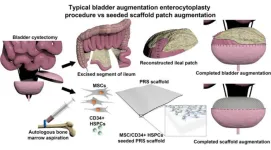(Press-News.org) Even though there is substantial variability in the contents and nutritional profiles of plant-based meat alternatives (PBMAs), the nutritional profiles tend to reflect a heart-healthy dietary pattern. A review article appearing in the Canadian Journal of Cardiology, published by Elsevier, of the available studies directly comparing the impact of plant-based and animal-based meats consistently suggests that the plant-based alternatives improve cardiovascular risk factors.
PBMAs are highly processed plant-based food products that typically replace meat in the diet. In Canada, the growing demand for PBMAs coincides with public health recommendations to reduce ultra-processed food consumption, which prompts the need to investigate the long-term health implications of PBMAs.
Lead author Matthew Nagra, ND, Vancouver, BC, Canada, says, "While the plant-based meat market has experienced significant growth in recent years and more and more Canadians are enjoying plant-based burgers, surprisingly little is known about how these meat alternatives may impact health and in particular cardiovascular disease risk. Thus, we sought to review the available literature on the topic to identify what is currently known and to provide direction for future research."
The authors of the article reviewed the research published from 1970 to 2023 on PBMAs, their contents, nutritional profiles, and impact on cardiovascular disease risk factors, such as cholesterol levels and blood pressure. Their analysis shows:
There is substantial variability in the contents and nutritional profiles of PBMAs.
On average, PBMAs tend to have a more heart-healthy nutritional profile than meat, although the high sodium content of some products may be of concern.
PBMAs have been shown to improve some cardiovascular risk factors, including cholesterol levels, in several randomized controlled trials.
PBMAs have not been shown to raise blood pressure, despite the high sodium content of some products.
There is currently a lack of long-term research evaluating how these alternatives may affect the risk of developing a heart attack or stroke.
There is currently little research on the healthfulness of some common components of PBMAs, such as vital wheat gluten (seitan).
The authors of the review article were surprised to find that there is a near complete lack of research on vital wheat gluten, which is the primary protein source incorporated into many popular PBMAs, and cardiovascular risk factors.
Dr. Nagra continues, “Further, the lack of research on cardiovascular outcomes as of 2023 is shocking, given that there are randomized controlled trials evaluating risk factors dating back to 1990. More detailed research is needed in light of the increasing consumption of PBMAs and our lack of knowledge of how these products impact risk.”
In an accompanying editorial, J. David Spence, CM, MD, FRCPC, FAHA, Professor Emeritus of Neurology & Clinical Pharmacology, Western University, and Director, Stroke Prevention & Atherosclerosis Research Centre, Robarts Research Institute, London, ON, Canada, notes, "In an excellent review of PBMAs, Nagra et al. focus on reduction of cardiovascular risk factors, and the effects of various individual dietary factors on cardiovascular risk."
However, Professor Spence points out that, "What really matters is not the effect of individual components of a diet, nor the effect of diet on cardiovascular risk factors; it is the effect of diet on the actual risk of cardiovascular events such as myocardial infarction and stroke. Most physicians markedly underestimate the cardiovascular benefit of diet and place far too little emphasis on diet in the management of patients at high risk of cardiovascular events."
Senior author of the review article Ehud Ur, MB, FRCPC, Professor, Division of Endocrinology & Metabolism, University of British Columbia, Vancouver, BC, Canada, concludes, "For those looking to reduce their meat intake, especially if it’s red meat, replacing that with PBMAs is likely a heart-healthy choice. For those who already limit their meat intake, PBMAs can be incorporated into a healthy dietary pattern as an excellent protein source; however, it may be beneficial to choose options that are lower in saturated fat and sodium if consuming them regularly."
Finally, Dr. Spence adds a note of caution regarding the dietary implications of egg consumption, saying, "Persons at risk of cardiovascular disease should limit meat intake and avoid egg yolk, so plant-based meat substitutes and egg substitutes are helpful to patients wishing to reduce their cardiovascular risk. Their effect on reducing actual cardiovascular risk is undoubtedly much greater than their effect on cardiovascular risk factors."
END
"A hearty debate" concludes plant-based meat alternatives are healthier for your heart than meat
Review article in the Canadian Journal of Cardiology analyzes the impact of PBMAs on cardiovascular disease risk factors, such as cholesterol levels and blood pressure
2024-06-26
ELSE PRESS RELEASES FROM THIS DATE:
Convolutional optical neural networks herald a new era for AI imaging
2024-06-26
Convolutional Neural Networks (CNNs), with its exceptional image recognition capabilities, have performed outstandingly in the field of AI and notably within platforms like ChatGPT. Recently, a team of Chinese researchers from University of Shanghai for Science and Technology have successfully introduced the concept of CNNs into the field of optics and realized convolutional all-optical neural network, bringing revolutionary progress to AI imaging technology.
Led by Prof. Min Gu and Prof. Qiming Zhang from School of Artificial Intelligence Science and Technology (SAIST) at the University of Shanghai for Science and Technology ...
Molecular mapping reveals tissue-specific gene regulation by diabetes-linked transcription factors
2024-06-26
SINGAPORE — Scientists have generated a comprehensive map of the gene targets regulated by the transcription factors HNF4A and HNF1A in human pancreatic beta cells and liver cells. Published in the journal Nature Communications, the study revealed common and tissue-specific molecular pathways regulated by HNF4A and HNF1A, two proteins that possess important functions governing the development and function of the pancreas and liver.
Notably, the scientists identified several novel gene targets in pancreatic beta cells, the cells responsible for insulin ...
Wildfires increasingly threaten oil and gas drill sites, compounding potential health risks, study says
2024-06-26
More than 100,000 oil and gas wells across the western U.S. are in areas burned by wildfires in recent decades, a new study has found, and some 3 million people live next to wells that in the future could be in the path of fires worsened by climate change.
Researchers from the University of California, Berkeley, said their analysis, which was published last week in the journal One Earth, is the first to examine historical and projected wildfire threats on oil and gas facilities in the U.S. While the public health effects of scorched and damaged drill sites are unclear, researchers said the study is a necessary step ...
Gender gaps in cardiovascular disease diagnosis and treatment persist; $28 billion opportunity found
2024-06-26
DALLAS, JUNE 25, 2024 — Cardiovascular disease is the leading cause of death for women, and gaps in care and access persist between women and men. Addressing those gaps could lead to an increase of at least 1.6 million years of quality life and boost the U.S. economy by $28 billion annually by 2040, according to a new report published today by the American Heart Association and the McKinsey Health Institute (MHI). To help close these gaps and foster gender specific cardiovascular disease science into implementation, the Association, observing 100 years of lifesaving service as the world’s leading nonprofit organization ...
Researchers propose the next platform for brain-inspired computing
2024-06-26
(Santa Barbara, Calif.) — Computers have come so far in terms of their power and potential, rivaling and even eclipsing human brains in their ability to store and crunch data, make predictions and communicate. But there is one domain where human brains continue to dominate: energy efficiency.
“The most efficient computers are still approximately four orders of magnitude — that’s 10,000 times — higher in energy requirements compared to the human brain for specific tasks such as image processing and recognition, although they outperform the brain in tasks like mathematical calculations,” said UC Santa Barbara ...
Following the ‘BATT Signal:’ A new signaling pathway controlling planarian germ cells
2024-06-25
Biogenic monoamines — molecules like dopamine and serotonin — are famous for their role as the brain’s emissaries of mood, learning and memory, stress mechanisms, and fight-or-flight responses in the body.
But these neurotransmitters existed in nature long before brains popped up in the evolutionary tree. They’re prevalent in plants, bacteria, and single-cell organisms as well, but their functions there are far less understood.
Scientists at the Morgridge Institute for Research have added another task for ...
For many urban residents, it’s even hotter than their weather app says
2024-06-25
DURHAM, N.C. -- There’s a strong chance that last week’s scorching temperatures were even hotter than reported for those living in underserved urban areas.
It’s been well established that more impoverished areas within cities are typically hotter than their wealthier neighborhoods. Dubbed “urban heat islands,” these communities have more buildings, less vegetation and somewhat higher population density, which combine to produce the heating effect.
New research from environmental engineers at Duke University has shown that citizen science tools used to gauge heat in these ...
Bladder buzz: technologies to improve bladder surgery and monitoring
2024-06-25
A functional, healthy bladder is something that many of us take for granted. Yet millions of Americans deal with bladder issues, ranging from temporary inconveniences to long-lasting conditions. While many bladder disorders can be managed with non-invasive solutions, some conditions may require surgery to restore bladder function.
In patients with major bladder issues, a cystectomy may need to be performed. In this procedure, some or all of the bladder is removed (reasons for this may include acute trauma or bladder cancer). Sometimes, to compensate for the loss of tissue, the bladder is augmented (made larger), typically with ...
Half of world’s lakes are less resilient to disturbance than they used to be
2024-06-25
American Geophysical Union
Press Release 24-27
For Immediate Release
25 June 2024
This press release is available online at: https://news.agu.org/press-release/worlds-lakes-less-resilient-climate-pollution/
AGU press contact:
Rebecca Dzombak, news@agu.org (UTC-4 hours)
Contact information for the researchers:
Ke Zhang, Chinese Academy of Sciences, kzhang@niglas.ac.cn (UTC+8 hours)
WASHINGTON — Nearly half of the world’s large lakes have lost resilience, or the ability to bounce back after an abrupt disturbance, in recent ...
International trial introduces another curative option for sickle cell disease
2024-06-25
Vanderbilt University Medical Center (VUMC) researchers are touting data from a multicenter, international phase 2 clinical trial showing a new, curative treatment for sickle cell disease (SCD).
The therapy, nonmyeloablative haploidentical bone marrow transplant (BMT) with thiotepa and posttransplant cyclophosphamide (PTCy), is proving to have equivalent efficacy and one-fifth the cost as recently FDA-approved myeloablative gene therapy options, according to Michael DeBaun, MD, MPH, director of the Vanderbilt-Meharry Center ...
LAST 30 PRESS RELEASES:
GLP-1 drugs associated with reduced need for emergency care for migraine
New knowledge on heritability paves the way for better treatment of people with chronic inflammatory bowel disease
Under the Lens: Microbiologists Nicola Holden and Gil Domingue weigh in on the raw milk debate
Science reveals why you can’t resist a snack – even when you’re full
Kidney cancer study finds belzutifan plus pembrolizumab post-surgery helps patients at high risk for relapse stay cancer-free longer
Alkali cation effects in electrochemical carbon dioxide reduction
Test platforms for charging wireless cars now fit on a bench
$3 million NIH grant funds national study of Medicare Advantage’s benefit expansion into social supports
Amplified Sciences achieves CAP accreditation for cutting-edge diagnostic lab
Fred Hutch announces 12 recipients of the annual Harold M. Weintraub Graduate Student Award
Native forest litter helps rebuild soil life in post-mining landscapes
Mountain soils in arid regions may emit more greenhouse gas as climate shifts, new study finds
Pairing biochar with other soil amendments could unlock stronger gains in soil health
Why do we get a skip in our step when we’re happy? Thank dopamine
UC Irvine scientists uncover cellular mechanism behind muscle repair
Platform to map living brain noninvasively takes next big step
Stress-testing the Cascadia Subduction Zone reveals variability that could impact how earthquakes spread
We may be underestimating the true carbon cost of northern wildfires
Blood test predicts which bladder cancer patients may safely skip surgery
Kennesaw State's Vijay Anand honored as National Academy of Inventors Senior Member
Recovery from whaling reveals the role of age in Humpback reproduction
Can the canny tick help prevent disease like MS and cancer?
Newcomer children show lower rates of emergency department use for non‑urgent conditions, study finds
Cognitive and neuropsychiatric function in former American football players
From trash to climate tech: rubber gloves find new life as carbon capturers materials
A step towards needed treatments for hantaviruses in new molecular map
Boys are more motivated, while girls are more compassionate?
Study identifies opposing roles for IL6 and IL6R in long-term mortality
AI accurately spots medical disorder from privacy-conscious hand images
Transient Pauli blocking for broadband ultrafast optical switching
[Press-News.org] "A hearty debate" concludes plant-based meat alternatives are healthier for your heart than meatReview article in the Canadian Journal of Cardiology analyzes the impact of PBMAs on cardiovascular disease risk factors, such as cholesterol levels and blood pressure




